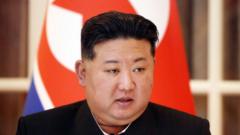In its recent statement, Pyongyang warns that military actions by the US undermine global security, urging a reevaluation of aerospace militarization.
**North Korea Criticizes US "Golden Dome" Missile Defense Plan as a Threat to Global Stability**

**North Korea Criticizes US "Golden Dome" Missile Defense Plan as a Threat to Global Stability**
North Korea claims the US's new missile defense system could escalate tensions and lead to an arms race in space.
North Korea has reacted harshly to the United States' "Golden Dome" missile defense initiative, recently proposed by President Donald Trump, stating that it poses a significant risk of turning space into a battleground for nuclear conflict. This new defense system is designed to confront emerging aerial threats, including advanced ballistic and cruise missiles.
According to reports from state media, North Korea's foreign ministry condemned the initiative as "self-righteous" and indicative of US arrogance, suggesting that it aims to militarize outer space and could ignite a worldwide nuclear and space arms race. Observers note that North Korea perceives the Golden Dome as a direct threat to its nuclear capabilities, compelling Pyongyang to seek alternative methods to ensure its defenses.
Hong Min, a senior analyst with the Korea Institute for National Unification, remarked that if the US were to successfully implement its missile defense program, North Korea might feel compelled to enhance its own arsenal to maintain its security posture. The North's current stance follows the enactment of a law in 2022 affirming its status as a nuclear power, along with recent missile testing that included the claim of an advanced hypersonic missile.
North Korea is not alone in its criticism—China has also expressed concerns over the Golden Dome initiative, labeling it as potentially offensive and detrimental to global strategic equilibrium. The Chinese foreign ministry emphasized that the US's approach to achieving its own security undermines the security of others.
While many experts believe that improving the US's missile defense capabilities is necessary, they caution that the Golden Dome program may encounter significant financial, technical, and diplomatic hurdles. Initial funding of $25 billion has been allocated, although projections suggest it could cost as much as $500 billion over the years, putting considerable strain on the US defense budget and raising questions about its feasibility.
According to reports from state media, North Korea's foreign ministry condemned the initiative as "self-righteous" and indicative of US arrogance, suggesting that it aims to militarize outer space and could ignite a worldwide nuclear and space arms race. Observers note that North Korea perceives the Golden Dome as a direct threat to its nuclear capabilities, compelling Pyongyang to seek alternative methods to ensure its defenses.
Hong Min, a senior analyst with the Korea Institute for National Unification, remarked that if the US were to successfully implement its missile defense program, North Korea might feel compelled to enhance its own arsenal to maintain its security posture. The North's current stance follows the enactment of a law in 2022 affirming its status as a nuclear power, along with recent missile testing that included the claim of an advanced hypersonic missile.
North Korea is not alone in its criticism—China has also expressed concerns over the Golden Dome initiative, labeling it as potentially offensive and detrimental to global strategic equilibrium. The Chinese foreign ministry emphasized that the US's approach to achieving its own security undermines the security of others.
While many experts believe that improving the US's missile defense capabilities is necessary, they caution that the Golden Dome program may encounter significant financial, technical, and diplomatic hurdles. Initial funding of $25 billion has been allocated, although projections suggest it could cost as much as $500 billion over the years, putting considerable strain on the US defense budget and raising questions about its feasibility.


















